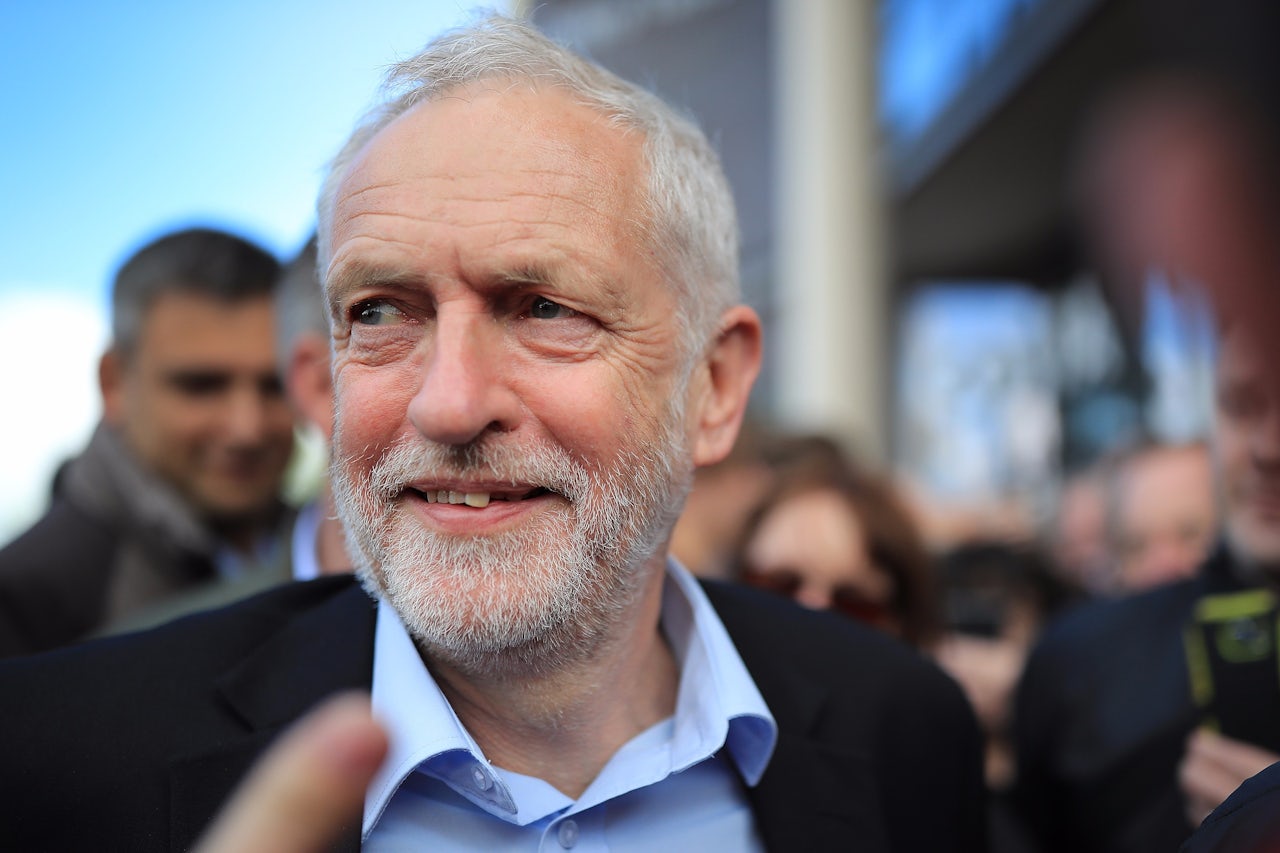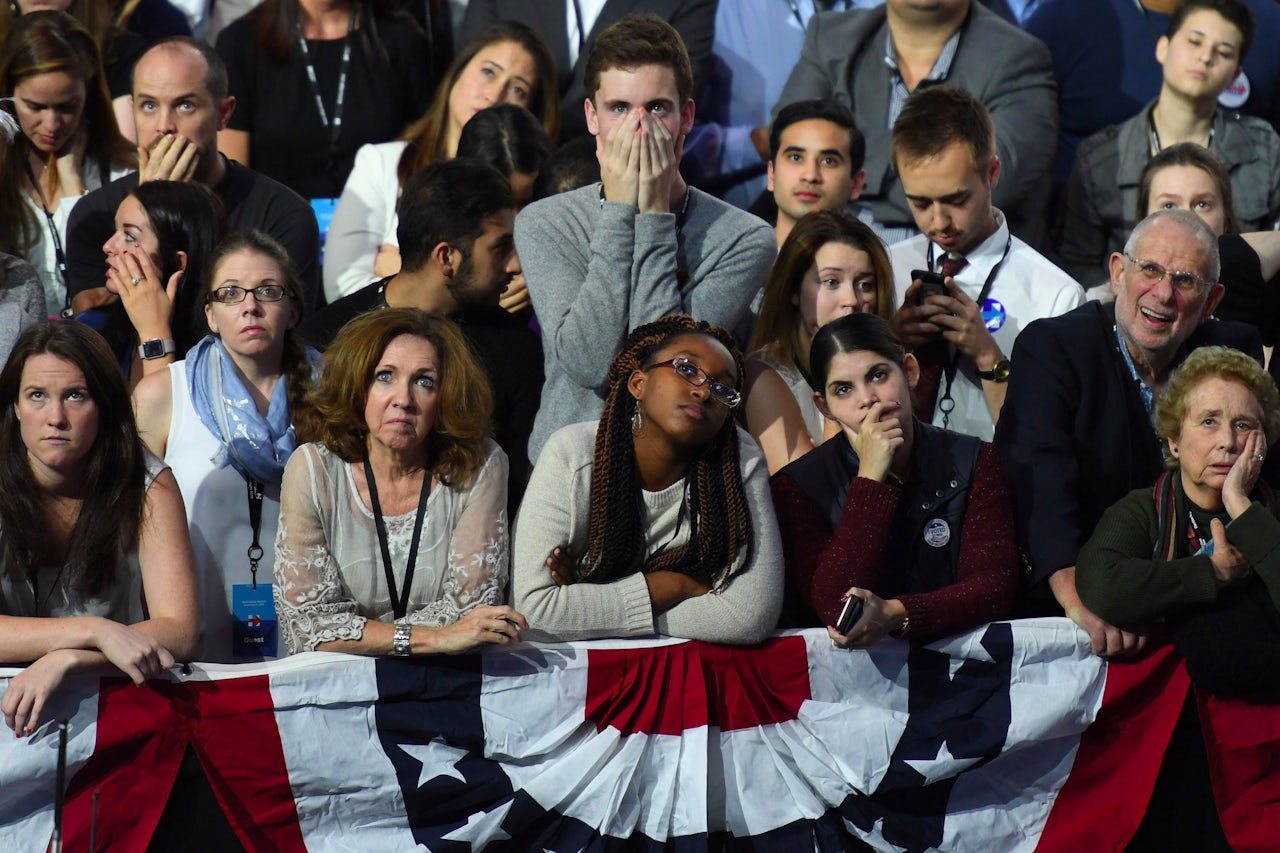Last Friday, I found myself hunched over my laptop watching a stream of BBC’s Question Time, a great show where audience members apparently berate their politicians for being idiots and cowards. Eventually, the audience zeroed in on Labour Party leader Jeremy Corbyn over his hypothetical unwillingness to nuke a country whose leaders had just done the same to the United Kingdom. Despite the heckling he received, Corbyn was defiant. “If we did use [a nuclear bomb], millions are going to die,” he said as several in the crowd grunted their disgust. “You have to think this thing through.”
Try to imagine any American politician saying this on national television six days before an election.
I’ve long had only a cursory interest in U.K. politics. But as the corpse of America’s political system continues to very publicly rot, the prospect of again relying on the Democratic Party’s leadership to stop the far right continues to be the most depressing bullshit in the world. Because of that, American left-wingers like myself have found ourselves looking for an escape over the past few weeks in the stratospheric rise of the Labour Party — led by Corbyn, an unabashed socialist — in the polls ahead of this Thursday’s UK election.
L A B O U R W A V E: RED SON RISING pic.twitter.com/8X8CkkXvS1
— Lana Del Raytheon (@LanaDelRaytheon) June 2, 2017
High energy Jezza gonna walk into the Leader Debate like pic.twitter.com/HiThdZ8m3o
— Ayatollah Cumonme (@Phonycian) May 31, 2017
This election was supposed to be the nail in the coffin of the Corbyn experiment. When Prime Minister and Conservative Party leader Theresa May called an early election in April to strengthen her majority ahead of Brexit negotiations with the European Union, Corbyn was down in some polls by over 20 points. But May’s lead has been decimated since then; one poll released Monday indicated that the Conservatives would drop enough seats to lose their majority, while another showed that May’s lead dropped from six points to one in a week. As left wing activist Paul Mason told the New Republic last week: “They assumed Corbyn was their secret weapon. It turns out he is our secret weapon.”
Corbyn became the leader of Labour in 2015, after the party suffered a disastrous defeat to David Cameron’s Conservative Party. His name was originally put forward by other Labour members of Parliament only as a courtesy to the left to “widen the debate.” Instead, Corbyn defeated the three other challengers with 59 percent of the vote. Then, shortly after the country voted to leave the European Union last year, Corbyn faced another leadership election from disgruntled liberals and centrists in the party — who argued he was “unelectable”— and won again with an even bigger share.
“They assumed Corbyn was their secret weapon. It turns out he is our secret weapon.”
Corbyn has had a surge for similar reasons to why Brexit had a surge, and the same reason that Trump and Sanders had a surge here: the current system is in crisis and has been for years, and when that happens people go looking for someone to blame. The difference between Corbyn and the far right, however, is that the right's "someone" are the most vulnerable: people of color, particularly immigrants and Muslims. Corbyn's "someone" is the financial and political elite who have been running his country into the ground for the last four decades, which is a much more accurate assessment of where the problem lies.
We know, from Trump and Brexit, that there's a constituency on the right for their nonsense. So the actionable lesson that the left can take from Corbyn outperforming (admittedly low) expectations on Thursday would be that the larger public, and not just a left-wing base, has a hunger for creating a more fundamentally equal society. It would prove that conventional wisdom is outdated and wrong. Watching Corbyn rise on a socialist message is more than just escapism for American progressives. It might be able to provide a guide for how they can win, too.
Consider the current state of the American left. Bernie Sanders’ insurgent run for president last year showed that there’s a new constituency for New Deal-style ideas and programs, and he undeniably kickstarted the careers of a lot of activists who will eventually come to run the Democratic Party or whatever replaces it. But in the short-term, things look bleak — two Sanders Democrats just lost close Congressional special elections, and potential 2020 challengers to Trump include people like Mark Zuckerberg and Cory Booker, who are both about as inspirational as a Dilbert strip.
In the current political moment, a sudden interest in the elections of other Western countries isn’t anything unique to the left. The far right has formed a sort of international solidarity around nationalist leaders; think of the affinity that the U.K. Independence Party’s Nigel Farage and Greece’s neo-Nazi party have for Donald Trump, or the glorified press releases Breitbart wrote about France’s Marine Le Pen and the Netherlands’ Geert Wilders, who both lost in their respective presidential elections this year. Meanwhile, centrists have taken to figures like France’s new president Emmanuel Macron, who was endorsed by Barack Obama, and German chancellor Angela Merkel, who the New York Times suggested might be the “liberal West’s last defender” after Trump’s election.
Nor is it anything new. With regard to the United Kingdom and the United States, the close allies’ destinies have been intrinsically connected since the Second World War. Numerous times over the past 40 or so years — particularly in the “special relationship” of Margaret Thatcher and Ronald Reagan and the Third Way response to 80s conservatism by Tony Blair and Bill Clinton — their politics have contemporaneously reflected that. Joe Biden’s 1988 presidential campaign, for example, was derailed by the discovery that he had plagiarized a speech by then-Labour leader Neil Kinnock.
This political connection between both countries is so strong, in fact, that the UK has recently become a beneficiary of our greatest political resource: overpaid campaign consultants. Jim Messina, the manager of President Barack Obama’s re-election campaign in 2012, is managing his second Tory campaign in a row, and David Axelrod — another Obama advisor — was a strategist on Ed Milliband’s failed Labour campaign in 2015.
Corbyn has often been compared to Sanders, who spoke fondly of Corbyn last week, and there are some similarities that excite American progressives. Both politicians have roots in activism, and both represented a left that was largely marginalized once the centrism of Tony Blair and Bill Clinton came to power. And in 2015, both came out of nowhere to run insurgent campaigns to lead their parties and have found a constituency in young people.
But aside from the fact that Corbyn and Sanders operate in very different political systems, Corbyn is much further to the left than Sanders on issues like the nationalization of some industries and foreign policy. On foreign policy in particular, Corbyn is a vocal critic of Israel and Saudi Arabia, two things which are practically unheard of in either American party. Sanders, on the other hand, recently joined his ninety-nine fellow Senators in condemning the United Nations’ “anti-Israel bias.” Someone with Corbyn’s politics achieving national prominence — let alone leading a major party— is a patently alien idea to most Americans.
Unlike Sanders, who never led Hillary Clinton in the Democratic primary, Corbyn has twice defeated the establishment wing of his party, and is now rapidly gaining on May. The reason that Corbyn is surging now, apart from the discovery that May is extremely bad at campaigning, is that he’s got a clear, progressive vision for the future, one that tackles the big question of making a more equitable society at home and around the world. The Labour Party manifesto unabashedly goes the farthest we’ve seen from a major left-of-center party; not just the Sanders-like social democratic parts like pumping more money into the National Health Service and making college free, but in nationalizing essential public services and raising revenues from increased taxes on the wealthy and corporations to pay for all of it.
“We have to respect the needs of people,” Corbyn responded to an audience member who asked if his manifesto was a “letter to Santa Claus” on Friday. “If we want to live in a society that genuinely cares for all, we’ve got to...be prepared to pay for it, and I’m prepared to do that.”
Corbyn’s growing popularity is exciting for American progressives because it suggests a path to winning
For all the differences between the U.K. and U.S., we share a lot of the same problems. Both Corbyn’s country and mine were affected by the same financial crash, and both still have a political elite that’s still deferential to the financial elite. “There has to be some kind of a reckoning,” Corbyn said of the British establishment in an April interview with The New Yorker. “You actually have to run an economy for the benefit of people, not run for the benefit of hedge-fund managers.”
Corbyn’s growing popularity is exciting for American progressives because it presents an opportunity for winning. Constantly saddled with the “unelectable” tag that has followed left-wing political candidates in both countries for decades, the Labour leader has proven that, in the crisis that the last decade has presented Western democracy, it might not apply anymore.
The fire that Corbyn and Sanders have rekindled in organizations like Momentum and the Democratic Socialists of America indicate that the international left still has room to grow. Corbyn could still lose badly; it wouldn’t be the first time British pollsters got it wrong. But if he shocks the world tomorrow, it’ll show that the West might be more ready for socialism than any of us previously thought.

